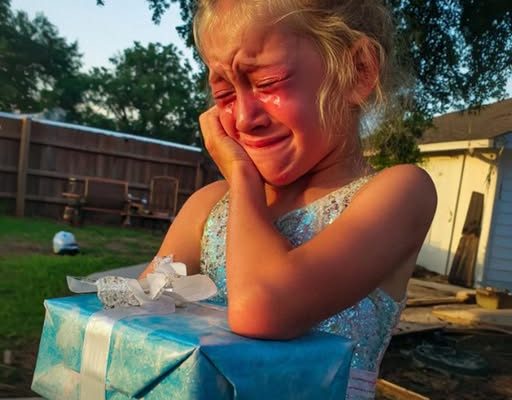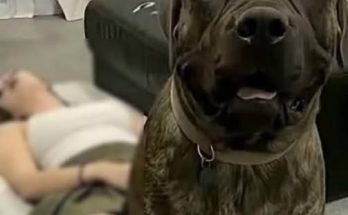When I met Daniel, I was 28, newly divorced, and already someone’s mother. My daughter, Ellie, was two then—sweet, curious, and the center of my world. I brought her along on a second date with Daniel, partly because I couldn’t afford a babysitter, but mostly because I needed to know: would this man love both of us?
Most men flinched when faced with that reality. They offered awkward smiles, forced interest, and treated her like a test to pass. But Daniel? He knelt down, admired her bunny socks, and spent twenty uninterrupted minutes helping her glue sequins to a wrinkled piece of construction paper. I watched from across the table, heart thudding, cold fries forgotten. It was the first time I saw a future that didn’t feel like compromise.
Two years later, we married. Ellie wore a flower crown and asked to walk down the aisle holding both our hands. At the reception, she stood on a chair, mouth full of cupcake, and called him her “almost-daddy.” The whole room laughed. Daniel cried.
He adopted her on her fifth birthday. We threw a backyard party—string lights, cake, lanterns swaying in the breeze. When she opened her gifts, she climbed onto Daniel’s lap and whispered, “Can I call you Daddy now? For real?”
He kissed her forehead. “Only if I can call you my daughter forever.”
I believed love would be enough. I thought, if we just held on tight to each other, the rest would fall into place. But sometimes, love doesn’t reach every corner—especially the ones where polite silence and generational bias fester beneath a smile.
Daniel’s mother, Carol, never said anything outright cruel. But she never included Ellie either. Cards were always addressed to “Daniel and Tina.” She never asked Ellie about school or commented on the holiday crafts she proudly mailed. And after one dinner, she eyed my lasagna and murmured, “You must’ve learned fast, raising a child on your own.”
Daniel would squeeze my hand and say, “Give it time.”
I did. Until the day she told my daughter she wasn’t part of the family.
It was a sunny Saturday. Daniel’s brother, Mark, was hosting a birthday party for his son, Jason. Ellie had picked out the perfect gift: a limited edition Pokémon card set wrapped in gold paper. She wore her sparkly blue dress, brushed her curls twice, and asked ten times if Jason would like it.
We dropped her off, kissed her cheek, and promised cupcakes later. Daniel and I headed out for lunch, smiling at the easy rhythm of the day—until my phone rang.
Ellie’s voice was soft, shaky. “Mommy? Can you come get me? Grandma said I had to go outside. She said… I’m not part of the family.”
Daniel ran to her, scooping her into his arms. She clung to him and sobbed the way only children do—when they’ve been hurt in a way they don’t fully understand but will always remember.
I didn’t hesitate. I walked straight into that house, past the balloons and the laughter and the cake. Carol sat calmly at the table, fork poised, chatting like nothing had happened.“Why is my daughter outside?” I asked, my voice low.
Carol didn’t blink. “Ellie’s not part of this family,” she said, like she was stating a fact.
Sarah, my sister-in-law, mumbled something about avoiding drama for Jason’s sake. I stared at them both. “You let a child cry in the backyard so you could enjoy cake? You should be ashamed.”
I turned and left before my anger turned volcanic.
Back home, Ellie clung to us the rest of the day. We took her for ice cream, let her pick the movie, and curled up beside her until she fell asleep between us, heart finally calm. That night, I made a decision: this would never happen again.Two weeks later, we threw a picnic for Daniel’s birthday. The invitation was clear: “Everyone who sees Ellie as part of this family is welcome.”
Carol texted, asking if she was excluded.
I replied: “Just following your rule, Carol. Not everyone here is family.”
She never responded.
But the picnic? It was magic. Fairy lights in the trees, blankets on the grass, laughter echoing through the yard. Mark came, holding Jason’s hand. No Sarah. No surprise.Jason ran straight to Ellie. “I told Grandma I didn’t like what she did,” he said. “You’re like my sister. I’ll never be like her.”
Ellie’s eyes widened. Then, wordless, she dashed into the house and came back with the gold gift bag. “I saved it,” she told him, out of breath. “I wanted you to have it.”
Jason blinked, stunned. “You still brought me a gift?”
“Of course,” she said, as if it were obvious. “It’s your birthday.”
That evening, I posted a photo: Ellie and Jason, shoulder to shoulder on a blanket, joy spilling from their faces.The caption read: “Family is love, not blood.”
Two weeks later, my phone buzzed. It was Carol.
Ellie stood beside me, clutching a bowl of grapes. “Is it her?” she asked. When I nodded, she reached for the phone.
“Hi, Grandma,” she said softly. “I forgive you… but don’t treat me like that again. It was ugly.”
She handed me the phone. “She said sorry.”
Later that night, Daniel admitted, “I told her if she couldn’t love Ellie like her own, she’d lose both of us. I meant it.”
Carol’s different now. She sends cards. She calls. She even baked Ellie’s birthday cake, pink frosting and all.
I remain cautious. But Ellie?
“I think Grandma will be better now,” she said while brushing her doll’s hair.
Maybe. Maybe not. But one thing is certain:
My daughter will never have to wonder if she belongs. Not in our home. Not in this family. And never in the story we’re writing for her—together.



